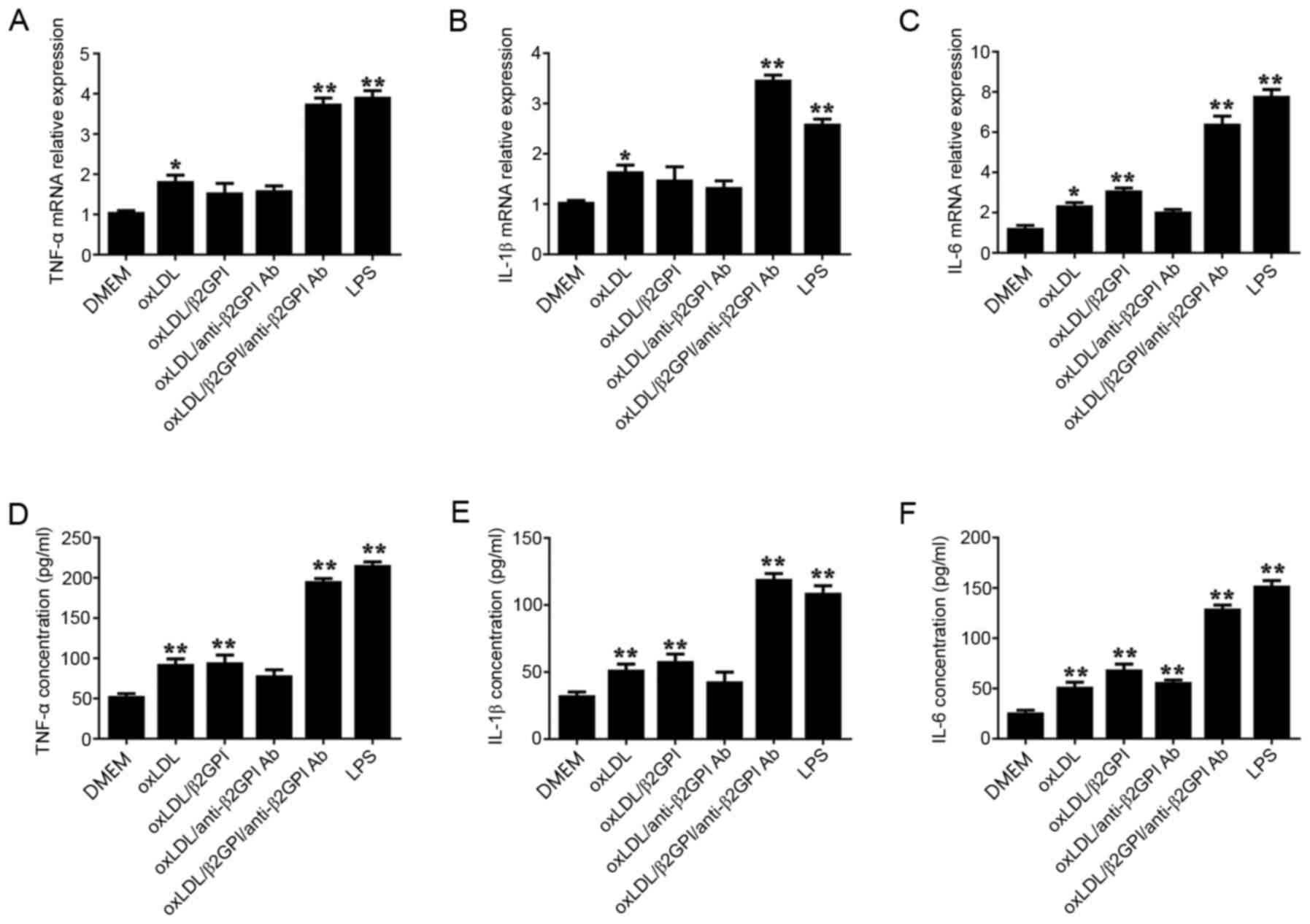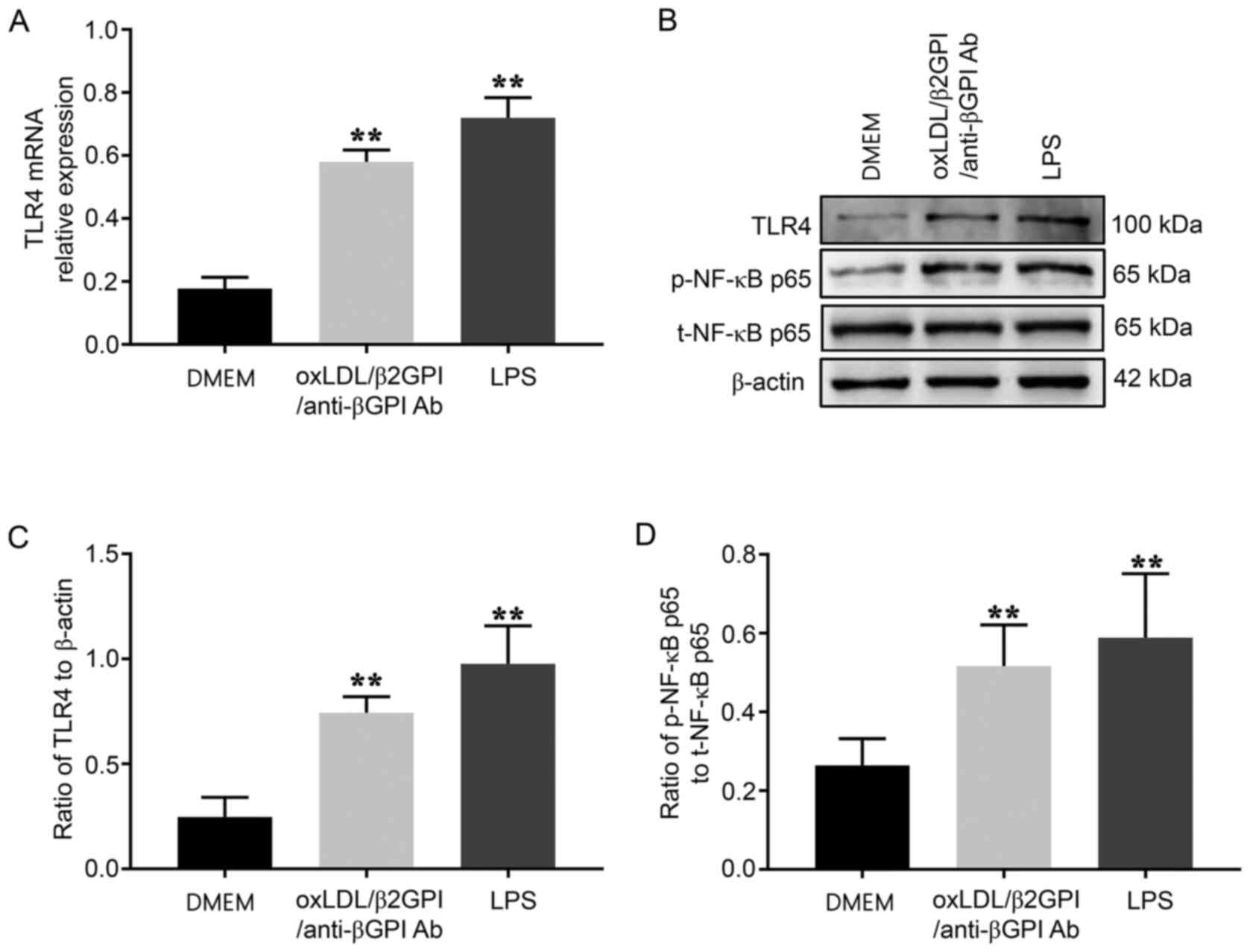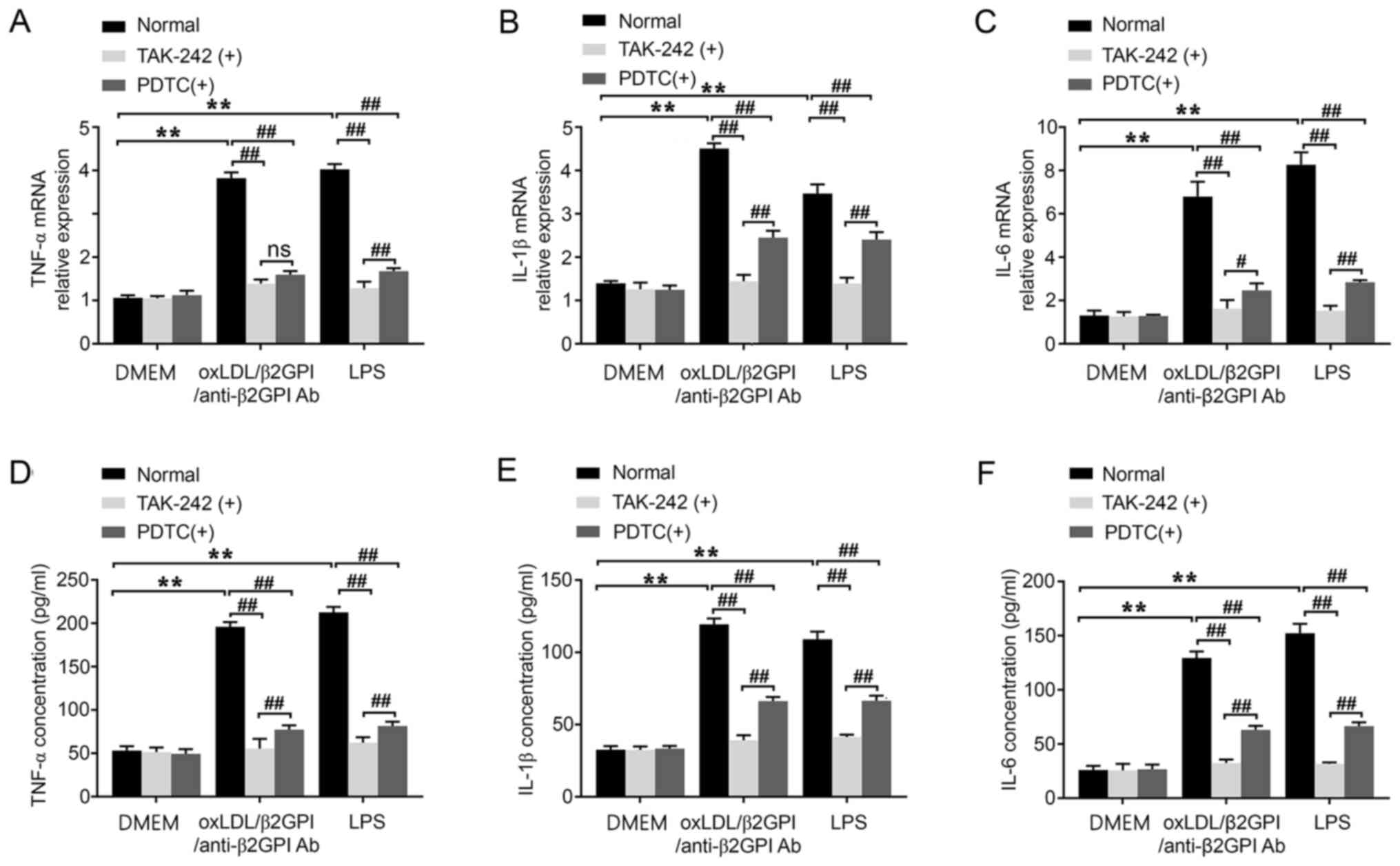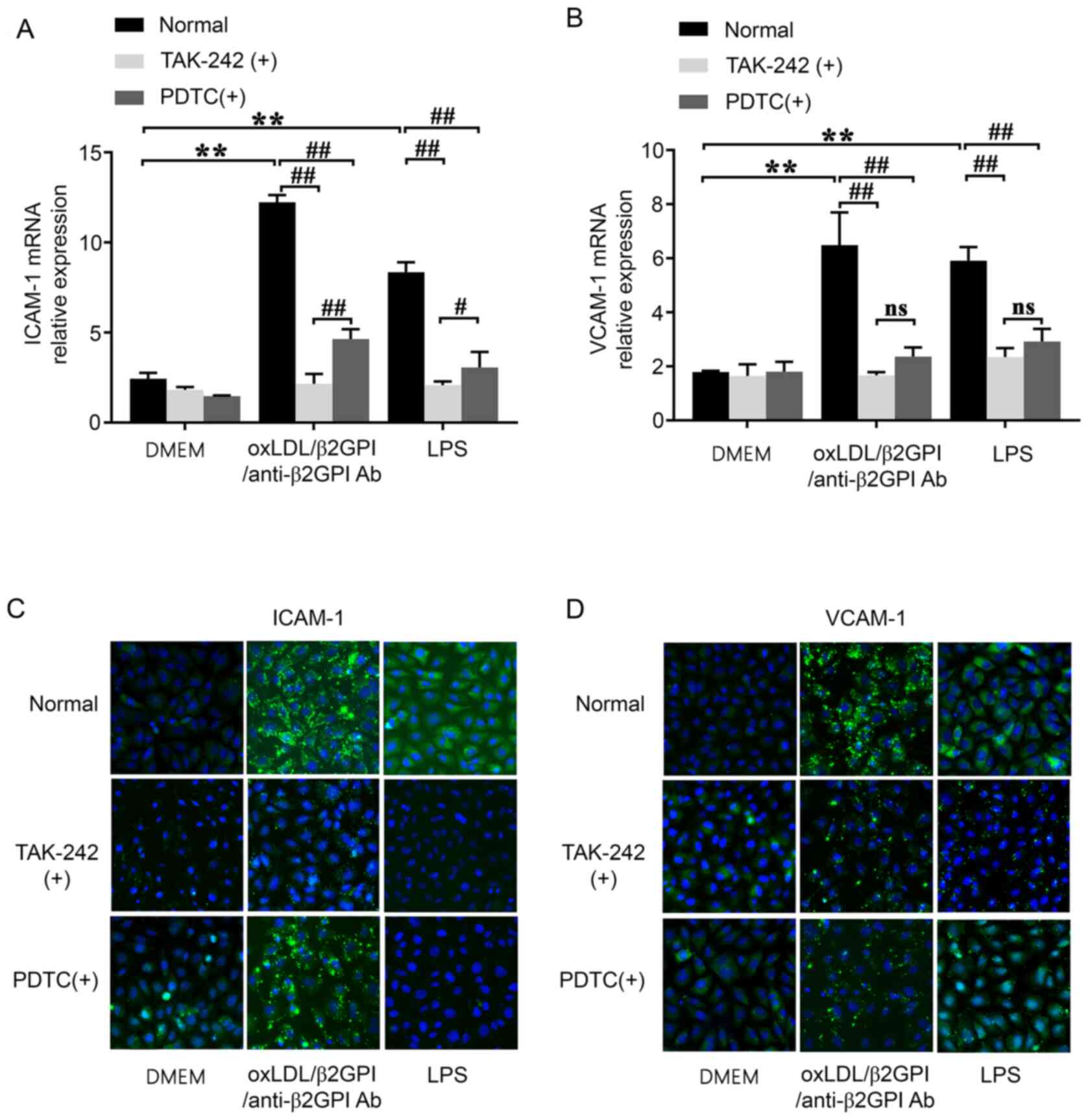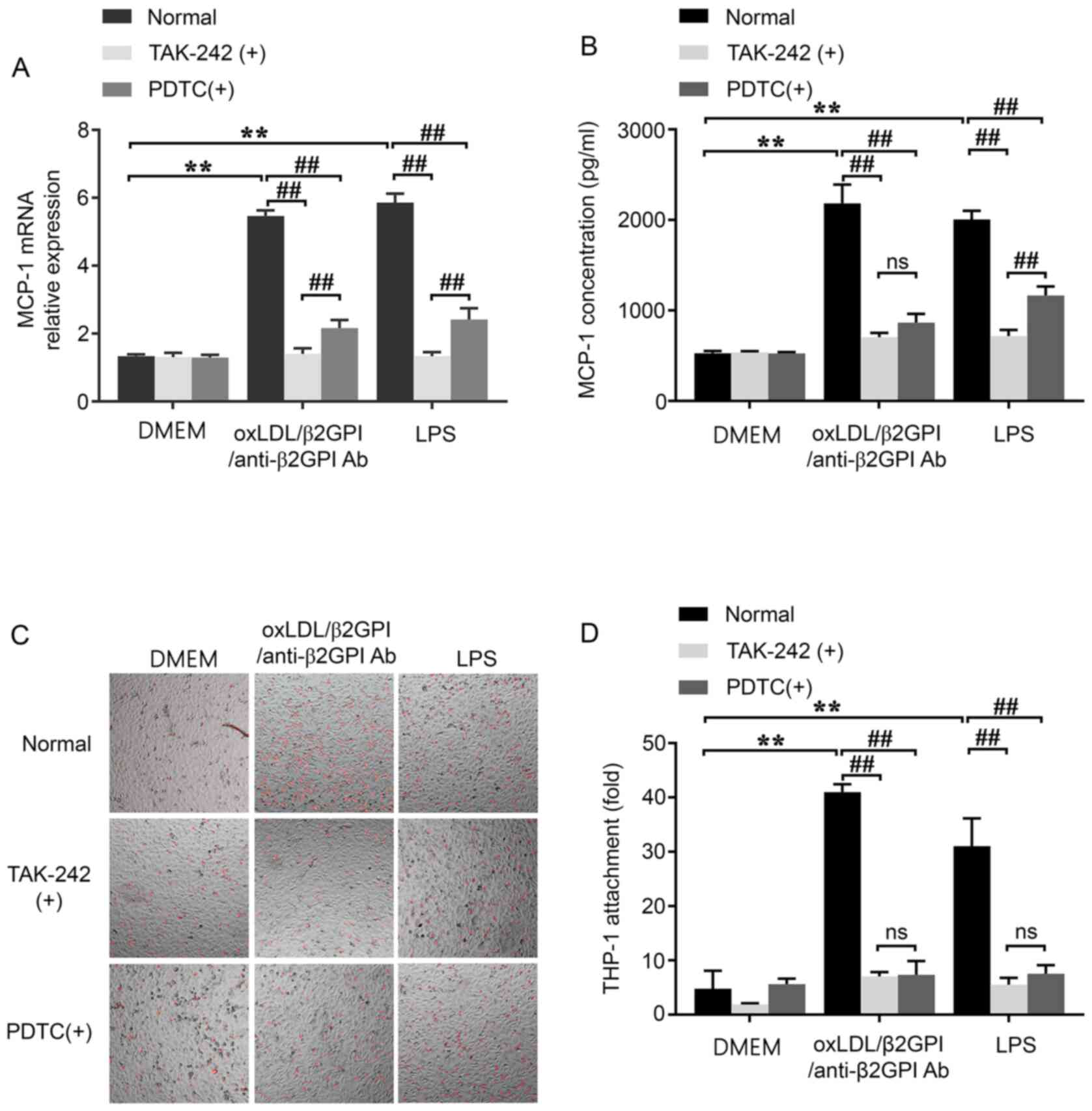|
1
|
Glass CK and Witztum JL: Atherosclerosis.
The road ahead. Cell. 104:503–516. 2001. View Article : Google Scholar : PubMed/NCBI
|
|
2
|
Mozaffarian D, Benjamin EJ, Go AS, Arnett
DK, Blaha MJ, Cushman M, de Ferranti S, Després JP, Fullerton HJ,
Howard VJ, et al: Heart disease and stroke statistics-2015 update:
A report from the American Heart Association. Circulation.
131:e29–e322. 2015. View Article : Google Scholar : PubMed/NCBI
|
|
3
|
Hansson GK, Libby P and Tabas I:
Inflammation and plaque vulnerability. J Intern Med. 278:483–493.
2015. View Article : Google Scholar : PubMed/NCBI
|
|
4
|
Matsuura E, Kobayashi K, Koike T and
Shoenfeld Y: Autoantibody-mediated atherosclerosis. Autoimmun Rev.
1:348–353. 2002. View Article : Google Scholar : PubMed/NCBI
|
|
5
|
Shoenfeld Y, Gerli R, Doria A, Matsuura E,
Cerinic MM, Ronda N, Jara LJ, Abu-Shakra M, Meroni PL and Sherer Y:
Accelerated atherosclerosis in autoimmune rheumatic diseases.
Circulation. 112:3337–3347. 2005. View Article : Google Scholar : PubMed/NCBI
|
|
6
|
Benagiano M, Gerosa M, Romagnoli J, Mahler
M, Borghi MO, Grassi A, Della Bella C, Emmi G, Amedei A, Silvestri
E, et al: β2 Glycoprotein I recognition drives Th1 inflammation in
atherosclerotic plaques of patients with primary antiphospholipid
syndrome. J Immunol. 198:2640–2648. 2017. View Article : Google Scholar : PubMed/NCBI
|
|
7
|
Onat D, Brillon D, Colombo PC and Schmidt
AM: Human vascular endothelial cells: A model system for studying
vascular inflammation in diabetes and atherosclerosis. Curr Diab
Rep. 11:193–202. 2011. View Article : Google Scholar : PubMed/NCBI
|
|
8
|
Gimbrone MA Jr and García-Cardeña G:
Endothelial cell dysfunction and the pathobiology of
atherosclerosis. Circ Res. 118:620–636. 2016. View Article : Google Scholar : PubMed/NCBI
|
|
9
|
Berg AH and Scherer PE: Adipose tissue,
inflammation, and cardiovascular disease. Circ Res. 96:939–949.
2005. View Article : Google Scholar : PubMed/NCBI
|
|
10
|
Lawson C and Wolf S: ICAM-1 signaling in
endothelial cells. Pharmacol Rep. 61:22–32. 2009. View Article : Google Scholar : PubMed/NCBI
|
|
11
|
Chen B, Meng L, Shen T, Gong H, Qi R, Zhao
Y, Sun J, Bao L and Zhao G: Thioredoxin attenuates oxidized
low-density lipoprotein induced oxidative stress in human umbilical
vein endothelial cells by reducing NADPH oxidase activity. Biochem
Biophys Res Commun. 490:1326–1333. 2017. View Article : Google Scholar : PubMed/NCBI
|
|
12
|
Profumo E, Buttari B, Alessandri C, Conti
F, Capoano R, Valesini G, Salvati B and Riganò R:
Beta2-glycoprotein I is a target of T cell reactivity in patients
with advanced carotid atherosclerotic plaques. Int J Immunopathol
Pharmacol. 23:73–80. 2010. View Article : Google Scholar : PubMed/NCBI
|
|
13
|
Kasahara J, Kobayashi K, Maeshima Y,
Yamasaki Y, Yasuda T, Matsuura E and Makino H: Clinical
significance of serum oxidized low-density
lipoprotein/beta2-glycoprotein I complexes in patients with chronic
renal diseases. Nephron Clin Pract. 98:c15–c24. 2004. View Article : Google Scholar : PubMed/NCBI
|
|
14
|
Yu R, Yuan Y, Niu D, Song J, Liu T, Wu J
and Wang J: Elevated beta2-glycoprotein I-low-density lipoprotein
levels are associated with the presence of diabetic microvascular
complications. J Diabetes Complications. 29:59–63. 2015. View Article : Google Scholar : PubMed/NCBI
|
|
15
|
Wang X, Zhu X, Zhou H, Xia L and Wang T,
Wang Z, Li Y, Yan J and Wang T: Anti-β2GPI antibodies enhance
atherosclerosis in ApoE-deficient mice. Biochem Biophys Res Commun.
512:72–78. 2019. View Article : Google Scholar : PubMed/NCBI
|
|
16
|
Wang T, Ouyang H, Zhou H, Xia L, Wang X
and Wang T: Pro-atherogenic activation of A7r5 cells induced by the
oxLDL/β2GPI/anti-β2GPI complex. Int J Mol Med. 42:1955–1966.
2018.PubMed/NCBI
|
|
17
|
Bierhaus A, Chen J, Liliensiek B and
Nawroth PP: LPS and cytokine-activated endothelium. Semin Thromb
Hemost. 26:571–587. 2000. View Article : Google Scholar : PubMed/NCBI
|
|
18
|
Lundberg AM and Hansson GK: Innate immune
signals in atherosclerosis. Clin Immunol. 134:5–24. 2010.
View Article : Google Scholar : PubMed/NCBI
|
|
19
|
Pierangeli SS, Vega-Ostertag ME, Raschi E,
Liu X, Romay-Penabad Z, De Micheli V, Galli M, Moia M, Tincani A,
Borghi MO, et al: Toll-like receptor and antiphospholipid mediated
thrombosis: In vivo studies. Ann Rheum Dis. 66:1327–1333. 2007.
View Article : Google Scholar : PubMed/NCBI
|
|
20
|
Brandt KJ, Kruithof EK and de Moerloose P:
Receptors involved in cell activation by antiphospholipid
antibodies. Thromb Res. 132:408–413. 2013. View Article : Google Scholar : PubMed/NCBI
|
|
21
|
Xie H, Sheng L, Zhou H and Yan J: The role
of TLR4 in pathophysiology of antiphospholipid syndrome-associated
thrombosis and pregnancy morbidity. Br J Haematol. 164:165–176.
2014. View Article : Google Scholar : PubMed/NCBI
|
|
22
|
Roshan MH, Tambo A and Pace NP: The Role
of TLR2, TLR4, and TLR9 in the Pathogenesis of Atherosclerosis. Int
J Inflamm. 2016:15328322016.
|
|
23
|
Ostuni R, Zanoni I and Granucci F:
Deciphering the complexity of Toll-like receptor signaling. Cell
Mol Life Sci. 67:4109–4134. 2010. View Article : Google Scholar : PubMed/NCBI
|
|
24
|
Wang T, Zhou H, Chen Y, Zhang P and Wang
T: The biphasic effects of the oxLDL/β2 GPI/anti-β2 GPI complex on
VSMC proliferation and apoptosis. Cell Signal. 57:29–44. 2019.
View Article : Google Scholar : PubMed/NCBI
|
|
25
|
Xu Y, Kong X, Zhou H, Zhang X, Liu J, Yan
J, Xie H and Xie Y: oxLDL/β2GPI/anti-β2GPI complex induced
macrophage differentiation to foam cell involving TLR4/NF-kappa B
signal transduction pathway. Thromb Res. 134:384–392. 2014.
View Article : Google Scholar : PubMed/NCBI
|
|
26
|
Zhang R, Zhou SJ, Li CJ, Wang XN, Tang YZ,
Chen R, Lv L, Zhao Q, Xing QL, Yu DM and Yu P: C-reactive
protein/oxidised low-density lipoprotein/beta2-glycoprotein I
complex promotes atherosclerosis in diabetic BALB/c mice via
p38mitogen-activated protein kinase signal pathway. Lipids Health
Dis. 12:422013. View Article : Google Scholar : PubMed/NCBI
|
|
27
|
Lopez LR, Kobayashi K, Matsunami Y and
Matsuura E: Immunogenic oxidized low-density
lipoprotein/beta2-glycoprotein I complexes in the diagnostic
management of atherosclerosis. Clin Rev Allergy Immunol. 37:12–19.
2009. View Article : Google Scholar : PubMed/NCBI
|
|
28
|
Livak KJ and Schmittgen TD: Analysis of
relative gene expression data using real-time quantitative PCR and
the 2(-Delta Delta C(T)) method. Methods. 25:402–408. 2001.
View Article : Google Scholar : PubMed/NCBI
|
|
29
|
Lu YC, Yeh WC and Ohashi PS: LPS/TLR4
signal transduction pathway. Cytokine. 42:145–151. 2008. View Article : Google Scholar : PubMed/NCBI
|
|
30
|
Galkina E and Ley K: Vascular adhesion
molecules in atherosclerosis. Arterioscler Thromb Vasc Biol.
27:2292–2301. 2007. View Article : Google Scholar : PubMed/NCBI
|
|
31
|
Lin J, Kakkar V and Lu X: Impact of MCP-1
in atherosclerosis. Curr Pharm Des. 20:4580–4588. 2014. View Article : Google Scholar : PubMed/NCBI
|
|
32
|
Matsuura E, Atzeni F, Sarzi-Puttini P,
Turiel M, Lopez LR and Nurmohamed MT: Is atherosclerosis an
autoimmune disease? BMC Med. 12:472014. View Article : Google Scholar : PubMed/NCBI
|
|
33
|
Denas G, Jose SP, Bracco A, Zoppellaro G
and Pengo V: Antiphospholipid syndrome and the heart: A case series
and literature review. Autoimmun Rev. 14:214–222. 2015. View Article : Google Scholar : PubMed/NCBI
|
|
34
|
Hughes GR, Harris NN and Gharavi AE: The
anticardiolipin syndrome. J Rheumatol. 13:486–489. 1986.PubMed/NCBI
|
|
35
|
Bassi N, Ghirardello A, Iaccarino L,
Zampieri S, Rampudda ME, Atzeni F, Sarzi-Puttini P, Shoenfeld Y and
Doria A: OxLDL/beta2GPI-anti-oxLDL/beta2GPI complex and
atherosclerosis in SLE patients. Autoimmun Rev. 7:52–58. 2007.
View Article : Google Scholar : PubMed/NCBI
|
|
36
|
Tuttolomondo A, Di Raimondo D, Pecoraro R,
Arnao V, Pinto A and Licata G: Atherosclerosis as an inflammatory
disease. Curr Pharm Des. 18:4266–4288. 2012. View Article : Google Scholar : PubMed/NCBI
|
|
37
|
Zernecke A and Weber C: Inflammatory
mediators in atherosclerotic vascular disease. Basic Res Cardiol.
100:93–101. 2005. View Article : Google Scholar : PubMed/NCBI
|
|
38
|
Ohta H, Wada H, Niwa T, Kirii H, Iwamoto
N, Fujii H, Saito K, Sekikawa K and Seishima M: Disruption of tumor
necrosis factor-alpha gene diminishes the development of
atherosclerosis in ApoE-deficient mice. Atherosclerosis. 180:11–17.
2005. View Article : Google Scholar : PubMed/NCBI
|
|
39
|
Schuett H, Luchtefeld M, Grothusen C,
Grote K and Schieffer B: How much is too much? Interleukin-6 and
its signalling in atherosclerosis. Thromb Haemost. 102:215–222.
2009. View Article : Google Scholar : PubMed/NCBI
|
|
40
|
Grebe A, Hoss F and Latz E: NLRP3
Inflammasome and the IL-1 Pathway in Atherosclerosis. Circ Res.
122:1722–1740. 2018. View Article : Google Scholar : PubMed/NCBI
|
|
41
|
Rocha DM, Caldas AP, Oliveira LL, Bressan
J and Hermsdorff HH: Saturated fatty acids trigger TLR4-mediated
inflammatory response. Atherosclerosis. 244:211–215. 2016.
View Article : Google Scholar : PubMed/NCBI
|
|
42
|
Higashimori M, Tatro JB, Moore KJ,
Mendelsohn ME, Galper JB and Beasley D: Role of toll-like receptor
4 in intimal foam cell accumulation in apolipoprotein E-deficient
mice. Arterioscler Thromb Vasc Biol. 31:50–57. 2011. View Article : Google Scholar : PubMed/NCBI
|
|
43
|
Płóciennikowska A, Hromada-Judycka A,
Borzęcka K and Kwiatkowska K: Co-operation of TLR4 and raft
proteins in LPS-induced pro-inflammatory signaling. Cell Mol Life
Sci. 72:557–581. 2015. View Article : Google Scholar : PubMed/NCBI
|
|
44
|
Edfeldt K, Swedenborg J, Hansson GK and
Yan ZQ: Expression of toll-like receptors in human atherosclerotic
lesions: A possible pathway for plaque activation. Circulation.
105:1158–1161. 2002. View Article : Google Scholar : PubMed/NCBI
|
|
45
|
Kempe S, Kestler H, Lasar A and Wirth T:
NF-kappaB controls the global pro-inflammatory response in
endothelial cells: Evidence for the regulation of a pro-atherogenic
program. Nucleic Acids Res. 33:5308–5319. 2005. View Article : Google Scholar : PubMed/NCBI
|
|
46
|
Tousoulis D, Kampoli AM, Papageorgiou N,
Androulakis E, Antoniades C, Toutouzas K and Stefanadis C:
Pathophysiology of atherosclerosis: The role of inflammation. Curr
Pharm Des. 17:4089–4110. 2011. View Article : Google Scholar : PubMed/NCBI
|
|
47
|
Scott DW, Dunn TS, Ballestas ME, Litovsky
SH and Patel RP: Identification of a high-mannose ICAM-1 glycoform:
Effects of ICAM-1 hypoglycosylation on monocyte adhesion and
outside in signaling. Am J Physiol Cell Physiol. 305:C228–C237.
2013. View Article : Google Scholar : PubMed/NCBI
|
|
48
|
Kawamoto T, Ii M, Kitazaki T, Iizawa Y and
Kimura H: TAK-242 selectively suppresses Toll-like receptor
4-signaling mediated by the intracellular domain. Eur J Pharmacol.
584:40–48. 2008. View Article : Google Scholar : PubMed/NCBI
|
|
49
|
Németh ZH, Deitch EA, Szabó C and Haskó G:
Pyrrolidinedithiocarbamate inhibits NF-kappaB activation and IL-8
production in intestinal epithelial cells. Immunol Lett. 85:41–46.
2003. View Article : Google Scholar : PubMed/NCBI
|
|
50
|
Tsai CS, Huang CY, Chen CH, Lin YW, Shih
CM, Tsao NW, Chiang KH, Lee CY, Jeng H and Lin FY: Eotaxin-2
increased toll-like receptor 4 expression in endothelial cells in
vitro and exacerbates high-cholesterol diet-induced atherogenesis
in vivo. Am J Transl Res. 8:5338–5353. 2016.PubMed/NCBI
|















